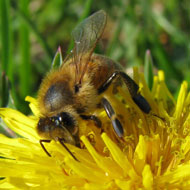
Scientists track flight paths of bumblebees
Research to understand the foraging habits of bees has revealed huge disparities in how they explore their environment.
Published in the journal PLOS ONE, the study also found that bees combine exploration of their environment with making the most of the food sources they had already found.
Bumblebees play a vital role in many ecosystems by pollinating flowers.
Researchers say that understanding how bees use the space available to them - and how they forage for food - will provide ‘valuable insights’ into how to manage landscapes to benefit plants, insects and agricultural crops.
“This study provided an unprecedented look at where the bees flew, how their behaviour changed as they gained experience and how they balanced the need to explore their surroundings," said lead author Dr Joseph Woodgate from Queen Mary University of London.
In the study, the team tracked bumblebees using harmonic radar technology and small, light-weight tags attached to each one.
They recorded 244 flights made by four bees, encompassing over 15,000 minutes and covering a total distance of more than 180km. It is the first the complete 'life story' of a bee has ever been recorded.
The researchers identified how bees flights fit into two categories - exploration and exploitation.
Exploitation takes place during efficient, straight trips, usually to a single foraging location. Meanwhile, exploration occurs in the first few flights made by each bee. This is when bees discover most of the places they will return to for feeding during their lives.
Researchers hope the results will aid understanding of how to manage crops so as to maximise the free pollination services provided by wild bees. The data may also aid manage conservation efforts to allow wild bee populations to flourish.
Furthermore, the study could help to explain how genes of bee-pollinated plants spread throughout the landscape and shed light on the way parasites and diseases can be spread between patches of plants.



 The Veterinary Medicines Directorate (VMD) is inviting applications from veterinary students to attend a one-week extramural studies (EMS) placement in July 2026.
The Veterinary Medicines Directorate (VMD) is inviting applications from veterinary students to attend a one-week extramural studies (EMS) placement in July 2026.